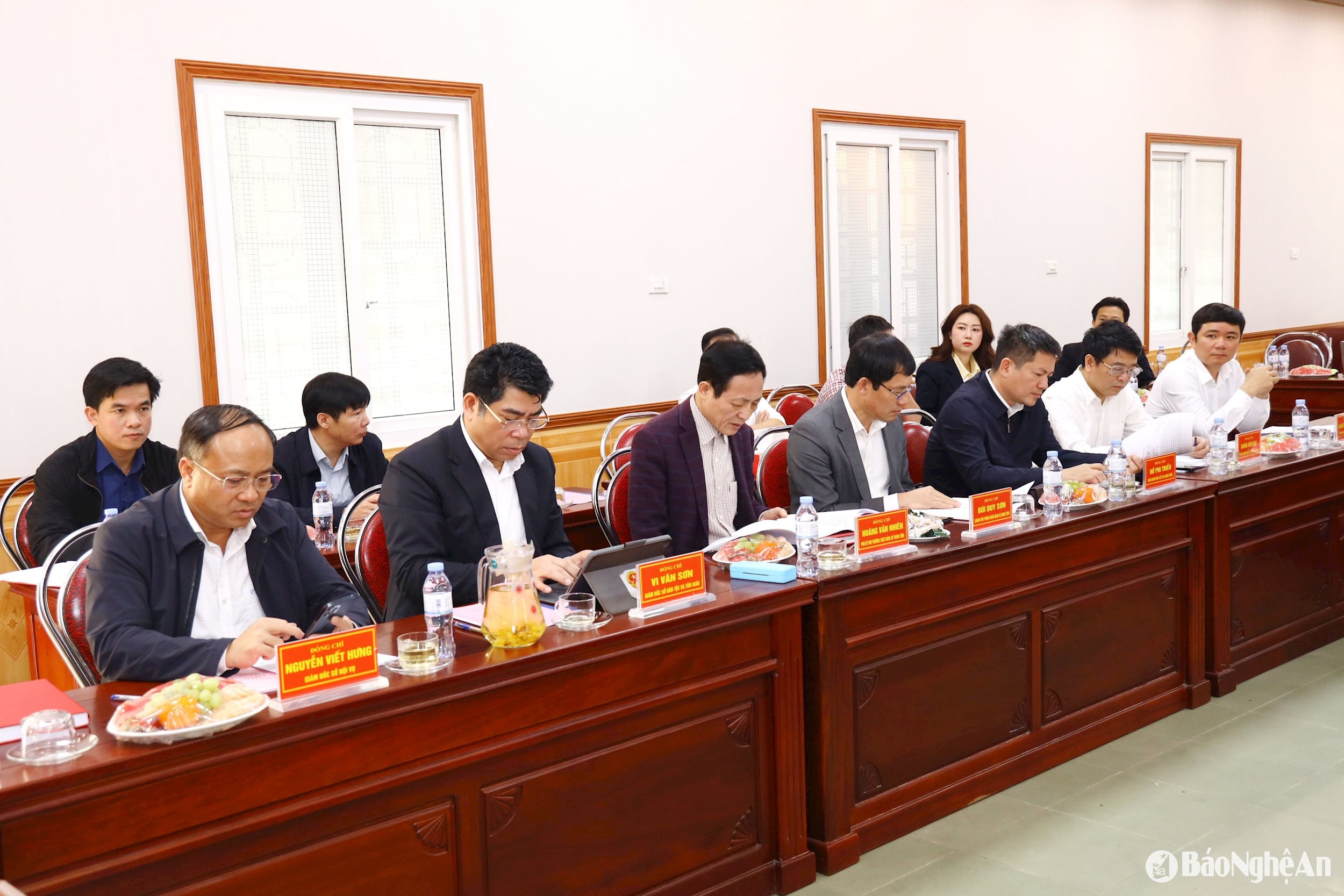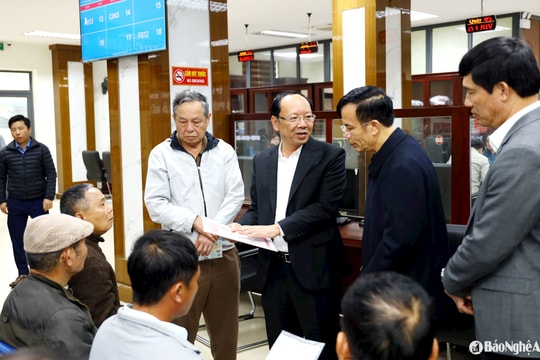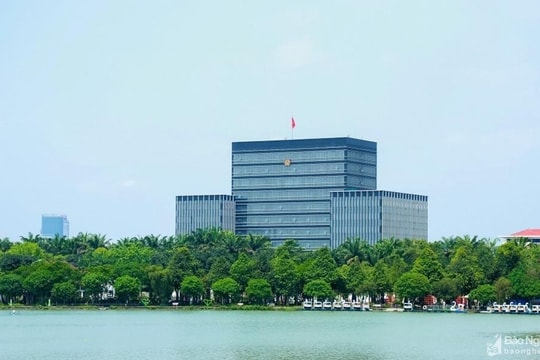Standing Vice Chairman of the Provincial People's Committee Bui Thanh An worked in Que Phong district on administrative unit arrangement.
On the morning of April 4, the Working Group to review, research, and orient the arrangement of administrative units at all levels and the construction of two-level local governments in Nghe An province, led by Comrade Bui Thanh An - Member of the Provincial Party Standing Committee, Permanent Vice Chairman of the Provincial People's Committee, worked in Que Phong district.

Promote the completion of projects
The working delegation included members of the Provincial Party Executive Committee: Nguyen Viet Hung - Director of the Department of Home Affairs, Vi Van Son - Director of the Department of Ethnic Minorities and Religions, along with leaders of the Provincial Party Committee, Provincial People's Council Committees, Provincial People's Committee Office, and leaders of the Departments of Construction, Finance, Culture - Sports and Tourism.
Working with the delegation, the leaders of Que Phong district included comrades Truong Minh Cuong - Member of the Provincial Party Executive Committee, Secretary of the District Party Committee, Chairman of the District People's Council; Sam Van Duyet - Standing Deputy Secretary of the District Party Committee; Cao Minh Tu - Deputy Secretary of the District Party Committee, Chairman of the District People's Committee and leaders of the district's departments and offices.
Comrade Bui Thanh An and the Provincial Working Group inspected the progress of the project to upgrade the Hanh Dich - Long Tien route, which started construction at the end of 2022 (including 3 packages: Hanh Dich - Muong Dan, Hanh Dich - Long Tien, Tien Phong - Hanh Dich). The route connects National Highway 48 to the 7-storey waterfall tourist area, Sao Va Hydropower Plant, Thai Co village, Sa Mu forest of Pu Hoat Nature Reserve, connecting with the border patrol road.

The project is nearly 5km long, 6.5m wide, with a 3.5m asphalt road surface, and is a level V mountainous traffic project. This is a public investment project from the central budget to implement the National Target Program on Sustainable Poverty Reduction for the 2021-2025 period, with a total investment of over 50 billion VND.
When completed, the above project will create favorable conditions for socio-economic development, ensuring national defense and security in Que Phong district. However, the project is currently behind schedule compared to the set target.
The reasons for the slow progress reported by Que Phong district are land clearance problems (due to having to change the purpose of forest use), the construction process generated a large volume of earth and rock requiring changes in construction methods, and the contractor has not really focused on human resources and means to organize the construction.


Comrade Bui Thanh An requested Que Phong district and the contractor to speed up the implementation of the Hanh Dich - Long Tien road project to serve the needs of infrastructure connection, socio-economic development, and strive to complete it before the end of the district-level administrative model.
The Standing Vice Chairman of the Provincial People's Committee and the working delegation inspected the upgrading of Que Phong Ethnic Minority Boarding Secondary School. The project to build and upgrade Que Phong District Ethnic Minority Boarding Secondary School was approved by the People's Committee of Nghe An province in Decision No. 4398/QD-UBND dated December 30, 2022. Construction started on December 28, 2023, and to date the project has been basically completed with a total investment of VND 24.7 billion. The school currently has 12 classrooms with 416 boarding students.
.jpg)

Comrade Bui Thanh An acknowledged the efforts of the district and the school in improving the quality of teaching and learning, ensuring good infrastructure and accommodation for teachers and students; At the same time, the district and new commune administrative units need to continue to coordinate with departments and branches to replicate many models such as Que Phong Secondary School for Ethnic Minorities.
Along with timely implementation of administrative unit arrangement plans, Que Phong district urges socio-economic development, promotes public investment disbursement, actively reforms administration, and digital transformation. Particularly for public investment disbursement in 2025, the total public investment capital plan in 2025 is allocated in detail in Que Phong district at 128,797 million VND (the capital plan for concentrated basic construction is 17,058 million VND and the capital plan for implementing 3 national target programs on new rural construction; socio-economic development in ethnic minority and mountainous areas; sustainable poverty reduction) is 111,739 million VND).
The 2025 public investment capital plan in Que Phong district is allocated for 54 projects and 1 task of supporting production land, including 34 transitional projects with a capital arrangement plan of 101,217 million VND and 20 newly started projects with a capital arrangement plan of 27,580 million VND.


According to Que Phong district's assessment, the current disbursement rate of public investment for target programs in the first quarter is from 5-12%. The district is urging units and localities to focus on accelerating the implementation of programs, contributing to promoting socio-economic development. However, in addition to the difficulties caused by the subjectivity of units and contractors, some projects are not advanced capital while the signed contracts have provisions for advance funding, causing difficulties for construction units in speeding up the implementation progress... Currently, the district has not yet been licensed for sand and soil mines; thus affecting the progress of basic construction projects in the area.
Develop a suitable administrative unit arrangement plan
Que Phong district, following the instructions of the Central and the province, has developed a plan to arrange administrative units according to regulations and actual conditions. In particular, the plan to arrange cadres and civil servants in new administrative units after the arrangementare carefully calculated; the plan for arranging public assets and the location of the new commune headquarters after the arrangement are surveyed based on regulations and actual situations, ensuring the most convenience for the people.


Que Phong district has considered plans to arrange specialized officials and civil servants at the district level to be distributed evenly to the communes after the reorganization to carry out tasks promptly and effectively. Que Phong district also reflected on existing problems such as some communes are expected to have difficulty in planning and selecting locations to build new headquarters after the merger to ensure working conditions for officials and civil servants, because the land fund of the communes is currently narrow, mainly forest land. Meanwhile, the large area and scattered residential areas will be a big obstacle after the administrative unit reorganization.
Leaders of Que Phong district have proposed a number of issues to the province and the Central Government to soon guide standards to facilitate the arrangement of administrative units, quickly promoting the efficiency, effectiveness and efficiency of the new administrative apparatus.



Speaking at the meeting with the leaders of Que Phong district, Comrade Bui Thanh An - Member of the Provincial Party Standing Committee, Permanent Vice Chairman of the Provincial People's Committee said that this administrative unit reorganization has a profound impact on all cadres at all levels and sectors, but the Central Government and the province are making efforts to apply many mechanisms and policies so that cadres and civil servants are not disadvantaged in order to focus on better serving the people and businesses. Comrade Bui Thanh An encouraged cadres and civil servants of the district and commune to be steadfast in their ideology, united in their actions, close to the people, and serve the people better.
When establishing new administrative units, communes in Que Phong district need to continue to implement socio-economic development goals well, especially focusing on effectively using public investment capital and capital from 3 national target programs: New rural construction; socio-economic development in ethnic minority and mountainous areas; sustainable poverty reduction. Accelerating project works will greatly contribute to promoting socio-economic development, serving people better and better.


Que Phong district also needs to speed up disbursement of public investment, resolve backlogs in resettlement for people affected by hydropower construction in the area; and coordinate to resolve issues of encroachment on cultivated land.
At the same time, continue to promote the effectiveness of forest economy, increase income for people through production models under forest canopy; promote the development of typical commodity economy. Que Phong district has many ethnic minorities living, with over 74 km of border adjacent to Laos. Accordingly, when establishing new administrative units in Que Phong, it is necessary to continue to focus on the work of pacifying the people, pacifying the people, pacifying the border area, building good relationships, and connecting with units of Laos, contributing to ensuring good border security and socio-economic development.
"We need to determine a common mindset in this administrative unit arrangement so that our homeland and country can develop more in the coming years. The most important thing is to continue to build solidarity and act together in unanimity to carry out the assigned tasks well. Therefore, I hope that cadres, civil servants and workers in Que Phong district will continue to promote the highest sense of responsibility and dedication for the common goal" - Comrade Bui Thanh An emphasized.


Regarding the recommendations of Que Phong district, comrade Bui Thanh An requested departments and branches to coordinate and promptly resolve them. At the same time, he instructed the district to build good standards on economics, technology, administrative headquarters, names, and administrative management for new commune administrative units when the district level ends its operations.
During that process, closely following the direction and requirements from the Central and the province, the new administrative government must ensure the best service to the people, ensure security and order, border security, sustainable poverty reduction, and increasingly prosperous household economic development.






